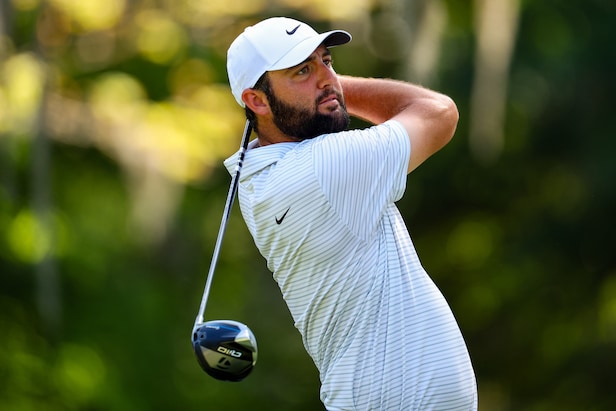In the aftermath of Grayson Murray’s death, here’s one way to give PGA Tour players real mental-health support – Australian Golf Digest

- by Admin
- June 25, 2024
Dr Michael Lardon has more than 25 years’ experience working as a mental-performance coach with elite athletes. His clients have won major championships, Olympic gold medals, Super Bowls, World Series titles and word championships in dozens of other disciplines. In addition to his private psychiatry practice in San Diego, Lardon is an associate clinical professor of medicine at UC–San Diego and a consultant at the United States Olympic Training centre in California. He’s the author of Mastering Golf’s Mental Game and numerous peer-reviewed articles on human performance and psychopharmacology.
[PHOTO: Icon Sportswire]
Today, mental-performance coaching is a standard part of an elite athlete’s framework. I have multiple conversations a week with competitors in every sport from MMA to showjumping to golf, but one of the most common misconceptions about the work I do is that it’s primarily devoted to helping athletes “think better” or block out distractions.
The reality is that mental-performance work is mental health work. I feel as responsible for my athlete clients as I do for the patients in my psychiatry practice in San Diego. Yes, shooting lower scores and winning tournaments are important, but living free of anxiety, depression and other mental-health risks is even more important. The facts are incontrovertible, too. A quarter of the population will suffer from mental illness at some point in life – whether through genetic loading for issues like bipolar disorder or obsessive-compulsive disorder or trauma from an environmental stressor. The PGA Tour environment – in which keeping a career alive can be a year-to-year or even week-to-week responsibility – is one of the most stressful in all of sports.
That’s why the tragedy of what happened to Grayson Murray is so important to talk about – and act upon. The professional tours and leagues like the NFL, Major League Baseball and the NBA have long accepted the idea that mental-performance coaching is good business, so to speak. However, there’s still an incredible stigma attached to mental illness and a reluctance to build real programs and infrastructure to help athletes deal with the incredible pressures and attention they face. It’s more than having a mental coach on your team. It’s having the resources to help in the place where they’re needed and in a way that isn’t shaming or hidden.
What does that look like, ideally? The PGA Tour could be a leader by establishing a mental-health centre in the same pattern as the mobile Player Performance physical training unit that follows the tour from stop to stop. It would be staffed by professionals trained to help guide players through breathing and other stress-reduction exercises and educate on dealing with anxiety and the myriad other issues they face. The staff would also be trained to recognise indications that a player needs urgent attention from a medical professional, and a network of doctors like me could work together to provide immediate telehealth assistance.
The unit would give players and the people travelling with them – family, coaches, caddies and other support staff – an immediate, on-site resource for any mental health concern. Even if it’s just a quiet place to talk to someone for a few minutes. It would be a phone-free, private zone without the frenetic energy of the clubhouse or locker room – a “mind centre” where a player could go to meditate or meet with his mental coach in a setting designed to facilitate that work. When a player is in crisis, like Grayson Murray clearly was in Texas? Those easy-access, shame-free interactions with trained clinicians and facilitators are the ones that most often redirect someone away from the tragedy of suicide.
We’ve come a long way from the early 1990s when I started my association with professional golf in a different role than the one I have now. I caddied for my brother, Brad, on his journey through Q-school and onto the tour – where I was a kind of curiosity among the other players and caddies as a practising psychiatrist. I’ll never forget watching another player miss a short putt at Q-school that was the difference between earning a card and spending the next year in what was at the time a much less lucrative minor league and absolutely crumble next to the last green.
There’s so much more money in the game, and opportunities for players to get in events all around the world, but with all the money and promotional opportunities infused into the deal that is life as a professional athlete, there’s so much more attention. That attention is coming from many places. A player’s every move is scrutinised – from the golf course to what he or she says on social media.
Is anyone really surprised that athletes – humans – under intense stress and incredible scrutiny would struggle with mental health? With the resources at the professional game’s disposal – either through direct investment from the tour or via a sponsorship from the vast world of mental-health-related commerce – we can help athletes return to mental health in the same matter-of-fact way we confront a torn ACL, stretched elbow ligament or broken bone.
We can do better.
The Latest News
-
December 29, 2024Australian cricket legend Rodney Hogg reveals his hatred of the MCG – and why he sells fake signed baggy greens
-
December 29, 2024Bumrah torments Aussies again to put India on top
-
December 29, 2024Aussie Test crowd record in sight for Boxing Day epic
-
December 29, 2024Australian reserve batter Josh Inglis ruled out of Border-Gavaskar Trophy with injury
-
December 29, 2024Is Mitchell Starc injured? Scott Boland provides update on ace Australian pacer’s condition | Sporting News Australia





